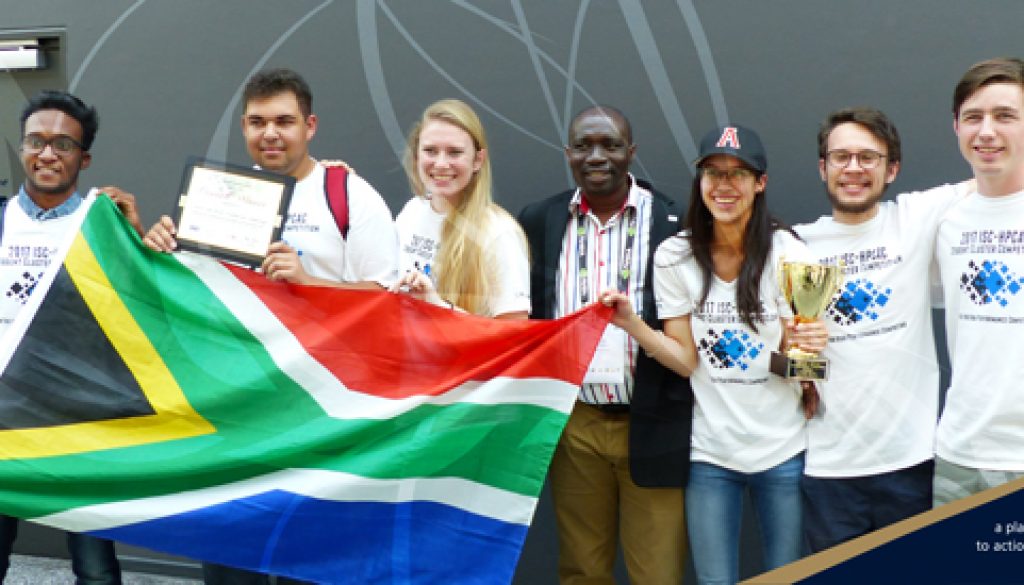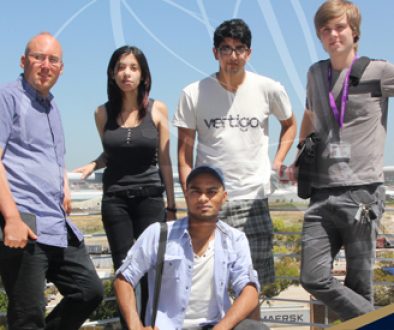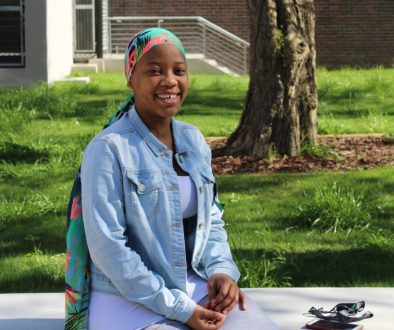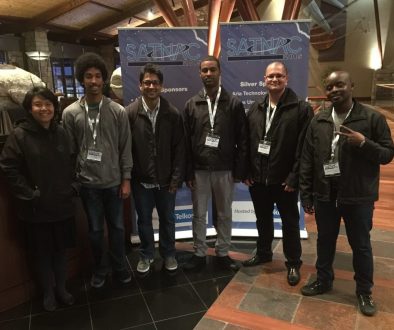UWC CS students lead Team SA in 2017 International Super-computing Competition -Repost
In a world where computing power and computer skills are becoming ever more important, South Africa continues to punch above its weight – as University of the Western Cape (UWC) and Stellenbosch University (SU) students showed when they led Team South Africa to second prize in the prestigious International Supercomputing Competition in Frankfurt, Germany this month.
The South African team was selected in December last year at the annual Centre for High Power Computing (CHPC) South African Student Cluster Challenge. Those winners, Mishka Mohamed, Kyle Jordaan, Tyrone de Ruiters and Liam Doult – who formed UWC’s Team No Windows – as well as SU’s Phillip Goosen and Lydia de Lange, went on to to Germany to build a small cluster of their design on the exhibition floor and race to demonstrate the greatest performance across a series of benchmarks and applications.
Over the past few decades, computer clusters (two or more computers connected in such a way that they are able to act as a single computer with way more power) have changed high performance computing, making massive computing power available to research teams with modest budgets and allowing more flexibility and customisability than traditional supercomputers.
The competition took place over three days of intense effort by 12 international teams. The team members were honoured guests of the Minister of Science and Technology, Naledi Pandor, at the Department of Science and Technology’s Budget Vote in parliament this year where she wished them well for the international competition.
Team South Africa has excelled at the ISC. Since the competition began, Team SA has won the international competition three times, with UWC again leading the team in one of those victories, and taken the second position once.
This year’s South African team was sponsored by Dell EMC for hardware equipment to the value of R2 million and Mellanox was the sponsor for network equipment worth R200 000.
The international competition is organised by the international High Performance Computing Advisory Council. This year’s competing teams were:
- Centre for High Performance Computing (South Africa)
- Nanyang Technological University (Singapore)
- Edinburgh Parallel Computing Centre, University of Edinburgh (United Kingdom)
- University of Science and Technology and National University of Defense Tech (China)
- Friedrich-Alexander University Erlangen–Nürnberg (Germany)
- University of Hamburg (Germany)
- National Energy Research Scientific Computing Centre (United States of America)
- Universitat Politècnica De Catalunya Barcelona Tech (Spain)
- Purdue University and Northeastern University (Unites States of America)
- The Boston Green Team (Boston University, Harvard University, Massachusetts Institute of Technology, University of Massachusetts – Boston (United States of America)
- Beihang University (China)
- Tsinghua University (China)
Team South Africa: From No Windows To The Finals
Team No Windows (the UWC portion of the team) was guided in their endeavours in the South African part of the competition by their staff mentor, the South African National Bioinformatics Institute’s (SANBI) Peter van Heusden, and their student mentor, Eugene de Beste – who was part of the winning team for the ISC for 2015. De Beste’s former ISC teammate, joined him in providing assistance and guidance at the international event – a helping hand that was much appreciated.
“I still remember playing on my dad’s old DOS computer and wondering how it works; so I’ve always loved computers, says Mishka Mohamed, who is completing her third-year BSc at UWC. “My interests shifted to the Supercomputing Competition as soon as I was presented with the opportunity to learn more about creating a super computer.”
“I am interested in high-performance computing because I want to build a supercomputer and gain experience through these events,” says Bellville-based UWC BSc Computer Science student Kyle Jordaan. “I also love all things computer related.”
Fellow BSc Computer Science student Tyrone de Ruiters, born and raised in Cape Town, found the competition a valuable experience. “I enjoy breaking down new problems and learning new skills, so I enjoyed the competition.”
Liam Doult from Durbanville – also doing his BSc Computer Science – is grateful both for the victory and the opportunity to hone his skills. After all: “What nerd doesn’t what to build a supercomputer?”
The Cluster Competition is designed to give undergraduate students exposure to the high power performance computing industry – an industry that’s increasingly crucial to researchers in fields as disparate as astrophysics, molecular biology and even history, where there are complicated operations to perform on often massive datasets.



